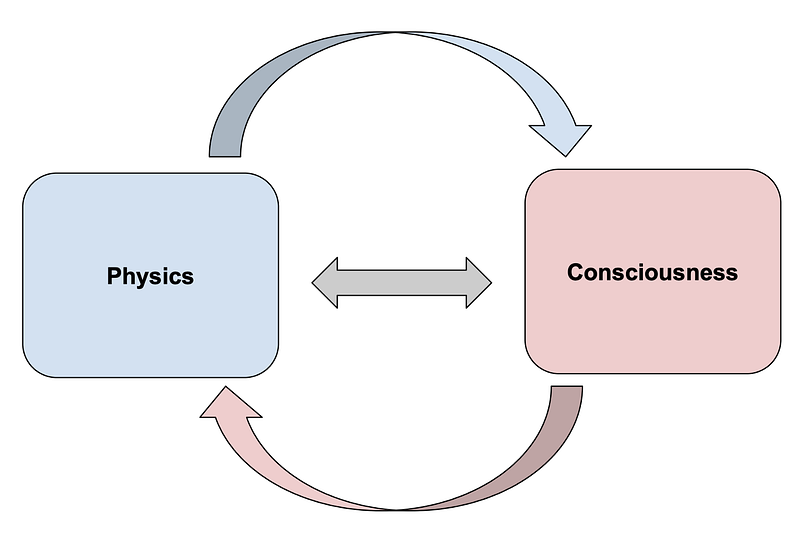# Exploring the Interplay Between Physics and Consciousness
Written on
Chapter 1: Understanding the Essence of Reality
The key questions in both science and philosophy revolve around understanding the nature, significance, and interconnections of two critical concepts:
- Physics: The external, objective reality of the universe.
- Consciousness: The internal, subjective experience of awareness.
At first glance, these two areas may seem entirely separate or even in opposition. However, they are profoundly intertwined in the very fabric of reality.
For instance, consider the role of the observer in Quantum Mechanics (QM) and the mathematical implications that may lead to scenarios like the Everettian multiverse. If conscious observation plays a role in QM—which stands as a foundational aspect of physical law describing our universe—then we must ponder the influence of consciousness in the universe's inception. After all, we exist in the faint remnants of the Cosmic Microwave Background Radiation, a relic from the universe's birth. Could this consciousness equate to a form of "God"?
Recent decades have witnessed remarkable advancements in the physical sciences, with progress accelerating rapidly. This evolution has largely concentrated on the objective physical world, often neglecting the significance of the conscious observer's subjective experiences. However, we are now approaching scientific developments where consciousness can no longer be overlooked. Here are some pivotal questions at the intersection of technology, science, and philosophy:
- While physics may eventually elucidate the events of the universe's creation, can it explain why it occurred?
- If one considers "God" in this context, does that not suggest a form of consciousness?
- Is it feasible to create sentient machines?
- Can we transfer our consciousness, currently based in organic neurons, to non-organic systems like silicon or graphene?
- What is the true nature of the observer in Quantum Mechanics?
Many of these inquiries rest upon implicit assumptions regarding the relative significance of physics and consciousness. Do minds emerge from physics? Are they distinct entities? Or do they represent different aspects of the same reality?
Defining the right questions is a challenging task, and finding resolutions is even more complex. To navigate these challenges, I utilize a framework to clarify my thoughts, dispel confusion stemming from implicit assumptions, and evaluate which ideas and models hold validity.

The Connection Between Physics and Consciousness
Category 1: Physicalism — Physics is More Fundamental Than Consciousness
In this perspective, consciousness does not require any supernatural explanation, as current physics suffices to account for its emergence. Consciousness is viewed as an emergent property arising from a physical system that processes information. Although this process can be intricate and complex—potentially exceeding our current scientific understanding—it remains a matter of information processing.
Inner subjective experiences could simply represent how computations manifest. Some argue that the sense of "self" is an illusion, but regardless of its nature, it fundamentally involves information processing.
Having trained in physics and maintaining a non-religious stance, I initially found this physicalist perspective to be intuitively convincing. However, I have recently reassessed my views, recognizing that science may never fully capture the essence of experiencing the world.
Category 2: Consciousness is Primary — Consciousness Is More Fundamental Than Physics
The objective laws of physical science appear inadequate to fully explain the experience of consciousness. It may be beneficial to adopt the assumption that consciousness is fundamental, at least as a working hypothesis.
Physics has provided us with remarkable laws describing the universe, but these laws presume the universe's existence. Questions arise about how and why the universe came to be and the origins of these physical laws. Such inquiries may extend beyond the reach of science and delve into the realms of philosophy and theology.
An illustrative analogy compares the brain to a television or radio receiver, suggesting that while consciousness may be primary, it could still be influenced by the brain's physical state. However, this idea should be approached cautiously since measurable data regarding such a signal is lacking.
Category 3: Dualism — Physics and Consciousness are Distinct, Equal, and Irreconcilable
This perspective posits that physics and consciousness exist as equal entities with no possibility for interaction. I consider this view to be the least convincing, as empirical evidence shows that physical interactions, such as drugs or brain lesions, can significantly impact consciousness.
Dualism might have seemed plausible before significant advancements in neuroscience, but contemporary scientific understanding challenges this notion.
Category 4: Pan-Psychism — Consciousness Pervades Physics
This view suggests that consciousness permeates the physical universe in varying degrees. However, there are limitations, particularly concerning elementary particles like electrons or quarks, which lack internal states.
What, then, constitutes the fundamental unit of consciousness if it does not align with elementary particles? The human brain may represent the upper limit of consciousness’s atomic unit. Neuroscience indicates that individuals with a severed corpus callosum exhibit distinct consciousness and personalities, suggesting that consciousness can be divided and recombined.
Non-Mutual Exclusivity
It is plausible that these categories are not mutually exclusive and may depend on the level of abstraction one considers. For example, Category 2, which posits consciousness as primary, could represent a conscious "God" giving rise to the cosmos. Conversely, once a physical system is established, consciousness might emerge from that system, aligning with the physicalist view of Category 1.
Categorization as Tools
Ultimately, we need not adhere to any singular category as the definitive explanation for the relationship between physics and consciousness. Instead, we should remain aware of the context in which we operate and consider the implications of each category or their possible combinations.
The first video explores the intricacies of consciousness and its connection to quantum physics, diving into theories and insights presented by Donald Hoffman.
The second video investigates the pivotal role of consciousness in quantum mechanics, featuring a discussion on its implications and significance.